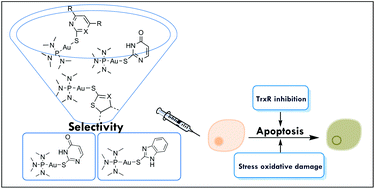New selective thiolate gold(i) complexes inhibit the proliferation of different human cancer cells and induce apoptosis in primary cultures of mouse colon tumors†
Abstract
New thiolate gold(I) complexes with P(NMe2)3 (HMPT) as a phosphane group [Au(SR)(HMPT)] (SR = Spy, Spyrim, SMe2pyrim, Sbenzothiazole, Sthiazoline, Sbenzimidazole and 2-thiouracil) have been synthesized. All of them have been characterized, including X-ray studies of complexes with SMe2pyrim, Sbenzothiazole and 2-thiouracil moieties. In addition, their potential application as anticancer drugs has been analyzed by determining their pharmacokinetic activities (water solubility, cell permeability and BSA transport protein affinity). Based on the good results of these experiments, we carried out the studies of cell viability with our compounds on different cell lines (A2780, A2780R and Caco-2/TC7 cells), showing higher cytotoxic activity than cisplatin in all cases. Besides, two of the synthesized complexes with Sbenzimidazole and 2-thiouracil groups exhibit specific selectivity for cancerous Caco-2 cells and are considered as potential candidates for anticancer drugs. These complexes were able to induce a strong inhibition of the thioredoxin reductase (TrxR) protein and oxidative damage in membrane lipids. Additional studies in primary cultures of mouse colon tumors showed that these two complexes are proapoptotic upon exposure to phosphatidylserine. Based on our results, we conclude that two of our thiolate gold(I) complexes are good and effective candidates for use in chemotherapy.



 Please wait while we load your content...
Please wait while we load your content...